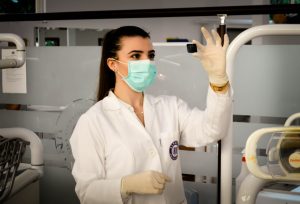Dental X-Rays
 At Latha Subramanian DDS we use digital X-ray technology, which has be proven to be safer than high-speed film X-rays and exposes are patients to the lowest amount of radiation possible. Our team takes precautions to protect our patients from exposure (e.g. lead aprons) and our equipment is regularly inspected and tested to make sure our patients are thoroughly protected. On average, taking full mouth dental X-rays delivers approximately 0.15 mSv of radiation, which is about the same amount of radiation exposure you’d get taking a cross-country flight.
At Latha Subramanian DDS we use digital X-ray technology, which has be proven to be safer than high-speed film X-rays and exposes are patients to the lowest amount of radiation possible. Our team takes precautions to protect our patients from exposure (e.g. lead aprons) and our equipment is regularly inspected and tested to make sure our patients are thoroughly protected. On average, taking full mouth dental X-rays delivers approximately 0.15 mSv of radiation, which is about the same amount of radiation exposure you’d get taking a cross-country flight.
Contact Latha Subramanian DDS today to schedule a consultation and find out how our dental x-rays can help improve the accuracy of your dental treatment!
Why are Dental X-rays Necessary?
Dental X-rays allow dentists to see beneath the surface of teeth and gums and helps them identify potential problems. Dental X-rays are a crucial diagnostic tool and are especially helpful in identifying dental problems, like cavities, before patients begin to experience pain or discomfort. There are some dental issues that cannot be diagnosed without X-rays.
Issues that dental X-rays can detect include:
- Abscesses and cysts
- Bone loss
- Tumors
- Developmental abnormalities
- Decay below gumlines
- Decay between teeth
- Poor tooth and root position
How Often Do Dental X-rays Need to be Taken?
Healthy adults typically need dental X-rays taken once every three to five years, though we will utilize existing X-rays when possible. Bite-wing X-rays, which are used to inspect the health of the back teeth, are generally only needed once every one to three years. The timeframe and frequency of X-rays can vary based on dental history. Dental X-rays may be needed more frequently in the event of a dental emergency or if you are experiencing dental pain.
Are Dental X-rays Safe?
Dental X-rays are safe and are regulated by both state laws and guidelines set out by the American Dental Association (ADA). Dentists typically adhere to the “As Low As Reasonably Possible” (ALARA) principle when it comes to dental radiographic examinations. This means precautions are taken to ensure X-ray exposure is justified in relation to treatment plans. We also make sure the exposure time is as low as possible and the doses received by patients is well under the allowed limit.
Is it Safe to Get Dental X-rays While Pregnant?
The American College of Radiation states that no single X-ray has enough radiation to harm a fetus or an embryo, and dental X-rays deliver a very small dose of radiation directed at the teeth rather than the body which further reduces any risk. Additional precautions (e.g. lead aprons, thyroid collars) can be taken to further protect you and the fetus from exposure.

